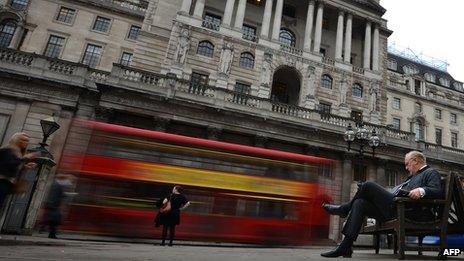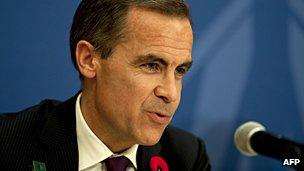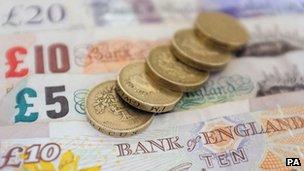Could 'hot potato economics' trigger an economic recovery?
- Published

If Sir Mervyn King said the economy would follow a zigzag course over the foreseeable future, the end of last year looks like it was whatever the down bit of a zigzag is called. Let us call it the "zag".
My coalition sources are braced for the gross domestic product (GDP) figures being bad when they are published at the end of the week.
There will be calls for "Plan B" from the opposition. These will, of course, be rejected by the government.
Some inside government believe 2013 will see growth, eventually - the "zig".
In fact, because oil prices are no longer soaring and there are signs of a recovery in the Far East, some government sources do predict privately that 2013 will eventually see what they could call a zigzag - proper growth. (These voices are currently outweighed by many other Cabinet ministers who are more bearish. They think the economy will have a tough time, for longer).
At the weekend the Ernst & Young Item Club piled on the pressure - they said that the Bank of England should have a target of nominal GDP - NGDP.

Mark Carney takes over as Governor of the Bank of England when Sir Mervyn King retires in June
"NGDP" is this - an economy's total output without adjusting for inflation.
The Bank of England is currently tasked with keeping inflation down at 2% and has to write to the Chancellor of the Exchequer to explain when it goes above that; quite a common occurrence.
The idea is that instead of targeting inflation, the Bank of England would instead have to target a particular amount of GDP growth and then go "all guns blazing" for it, triggering spending in an economy - and if the logic works, triggering a recovery.
I over-simplify - but the question of how to simplify this policy is relevant to the politics of it (more of which later).
Its champions pointed to what has been happening in the United States. This is what, last weekend, Prof Peter Spencer, chief economic adviser to the Item Club, said:
"[America] now actually has a target for unemployment - 6.5% unemployment with an inflation override - that's the sort of imagination that is actually putting a floor under the US economy and allowing it to continue to move forward."
The incoming Bank of England governor Mark Carney alluded to the desirability of NDGP in an interview at the back end of 2012.
And when he did so, the Chancellor of the Exchequer George Osborne told a group of MPs he was "glad" Mr Carney had done so (though he may of course have meant he was "glad" to be having the debate, rather than "glad" of any outcome of that debate).
Vince Cable's special adviser, Giles Wilkes, wrote a laudatory piece about NDGP years before he entered government and I know that two Tory ministers with economic portfolios support it.
Ahead of Mr Carney's arrival in June, it is an idea we should get our heads round - even if our more illustrious colleagues got their heads round this many moons ago.
Kick-start
Firstly, an explanation, before some observations on the politics of it.

Supporters argue targeting NGDP would boost the economy
Targeting inflation has been the wrong measure to target, NGDP's champions argue. Because inflation is expected to be kept low, it cannot go up and down freely in response to the economy's rhythms.
In 2011, for instance, government sources point out that inflation rose in a slowdown, which prompted policymakers and markets to tighten things up when actually they should have been loosening to help kick-start the economy.
This sends the wrong signals.
One government source told me: "It's like the thermostat of the British economy hasn't worked." The Bank of England, they believe, has a "dodgy measuring implement".
Instead, the argument goes, the Bank of England should have another remit - to have a target for what GDP should be, or what the economy should be growing at.
This would see the Bank (of course still independent of ministers) telling people - businesses and consumers - that they will keep on stimulating - its foot will go down on the pedal until, most likely, 5% growth has been achieved.
In the debate in the United States, 5% is reached because it takes the 3% rate of growth that economies should have, outside of a recession, and adds it to the supposedly ideal inflation rate of 2%. This makes it nominal - ie, it is the amount of growth, plus the actual value of all goods and services produced.
To this end, it would set about buying government bonds and other assets.
At the most extreme end, it would help the government with its public spending programme. But this would be the extreme end of things, and is extremely unlikely.
This is "hot potato economics" because there would be more money swilling around. Banks would have more money. The "hot potato" of credit would be passed on to financial services.
Because it would be cheap. Companies could make longer-term investments without fear of rates ratcheting up. These companies would then lend it out to make money on it.
There would be, the argument goes, a trickle-down of credit to mortgage seekers, to small businesses and to stores like HMV who are teetering on the edge.
"What really matters are growth expectations," one government source tells me. "Businesses and consumers all base their plans on how they think things will be, as opposed to the current static constraint on current income.
"But if they have been told to expect high future nominal GDP, they are more likely to consume or invest now.
"Setting a high stable path for NGDP growth, therefore, anchors the economy - hopefully triggering the building of more roads next week or inducing more consumption this year."
"Spending is depressed," another government source says. "There is clearly a problem... People don't feel they have enough income. People are holding on to their cash.
"If the Bank of England had to spend more, it would stimulate the economy by pumping liquidity into it."
That is the theory, though remember the idea with quantitative easing was similar - and its opponents have argued banks hoarded that money rather than disbursed it. NDGP's champions do not think that, properly executed, this need be true.
Its sceptics think the following (and these are clearly and succinctly rehearsed here by economist Chris Dillow, external):
That it is not really that new.
Mervyn King kept the Bank of England missing its inflation target in order to get more growth into the economy.
Mr King ran an NGDP policy in all but name.
It resembles quantitative easing so much that Ros Altmann - on behalf of pensioners - heavily dislikes it.
It would be bad for savers.
I will stick to the politics and let Dillow et al enlighten you to the economics.
Labour voices are quite pro. In fact they are dispirited that their party leadership have not sought to embrace it themselves.
"Mark Carney is one of the most trusted economists in the world," said one Labour source. "Why not make the running on this?"
What is stopping those inside government is that it looks panicky and there are people inside the Treasury who cannot see how it could be done without losing credibility and triggering a stampede on the bond markets. And it sounds opaque and a tad occult.
In the words of one government source, it sounds like it might not very easily pass "the Newsnight test". How would you explain it, in one sentence, to Jeremy Paxman?
We do not know what the government will do, but what we do know is that:
a) Excepting hopes for oil price stability and so on, this government is deeply worried about the non-appearance of growth, and (b) that it has long believed in loose monetary policy, alongside a tight fiscal policy.
Given they are desperate for growth, but equally desperate not to go for something that could be described as "Plan B", they might opt for plan NGDP. Or more pithily - "Plan M". "M" for monetary.
Hot potato economics. It is something us lay people need to get our heads round.
Newsnight is broadcast weekdays at 2230GMT on BBC Two. Or watch afterwards on the BBC iPlayer.